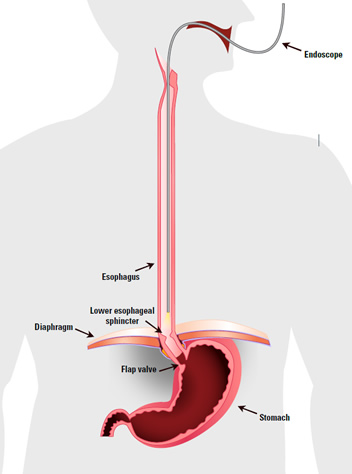Treatment for Acid Reflux Disease
Treatment for mild acid reflux disease involves dietary and lifestyle changes while medical surgical intervention is necessary to provide long-term relief from chronic heartburn.
While occasional bouts of heartburn or acid reflux can be managed with lifestyle changes and medication, acid reflux disease typically requires medical or surgical intervention.
The goals of acid reflux treatment are to:
- Reduce the amount of digestive juices, including stomach acid, that backflow into the esophagus
- Prevent damage to the lining of the esophagus
- Reduce the frequency of acid reflux symptoms, as well as the likelihood of GERD symptoms returning in the future.
Treatment for acid reflux disease ranges from changes to dietary and lifestyle habits to surgical intervention. For people who have GERD, which develops when there is damage to the lower esophageal sphincter, the most important treatment goal is to restore strength and function to the valve that separates the stomach and esophagus, thereby preventing further reflux of digestive juices into the esophagus.
Diagnosing Acid Reflux Disease
 Mild to moderate GERD are usually diagnosed by your doctor from the history and progress of your symptoms. In more severe cases, diagnostic tests may be employed to make a definitive diagnosis. The most frequently used and accurate test is the upper endoscopy. During this simple procedure your GERD surgeon places a tube down your throat while you are sedated. Using this tube or scope, your surgeon can visually inspect the upper part og the digestive system for signs of reflux and hiatal hernia. Hiatal hernias are often the cause of severs reflux disease.
Mild to moderate GERD are usually diagnosed by your doctor from the history and progress of your symptoms. In more severe cases, diagnostic tests may be employed to make a definitive diagnosis. The most frequently used and accurate test is the upper endoscopy. During this simple procedure your GERD surgeon places a tube down your throat while you are sedated. Using this tube or scope, your surgeon can visually inspect the upper part og the digestive system for signs of reflux and hiatal hernia. Hiatal hernias are often the cause of severs reflux disease.
Lifestyle Changes for Acid Reflux Relief
For those who are experiencing regular heartburn, lifestyle changes like weight loss and elimination of tobacco use is often recommended as a first line of treatment.
Obesity is one of the largest risk factors that contribute towards an individual’s risk of acid reflux disease. Weight loss and dietary changes can reduce the frequency and severity of acid reflux symptoms in some situations.
There are certain foods that are more likely to exacerbate the symptoms of acid reflux disease. These include items like spicy foods, caffeine, foods that are high in fat and sugar content, as well as some citrus. Eliminating these trigger foods from your diet can reduce the frequency of acid reflux symptoms.
Medical Treatment for Acid Reflux Disease
Medicinal treatment for acid reflux disease is designed to reduce the severity of symptoms by addressing the primary cause of discomfort: stomach acid. There are several different types of anti-reflux medications, and some are more effective than others. While there are many medications available over-the-counter without a prescription from your doctor, it is best to confirm with your acid reflux specialist before using any product.
Acid reflux medications are not designed to treat the cause of GERD, but can alleviate some of the symptoms.
Common types of GERD medications include:
- Antacids
- H2 receptor blockers
- Proton pump inhibitors
- Prokinetic agents
Each of these medications provide relief by targeting the production and release of stomach acid. These medications should only be used under the supervision of your acid reflux doctor, and are not recommended for long-term use.
Surgical Intervention for Acid Reflux Disease
Surgical treatment for GERD is recommended when symptoms of heartburn and acid reflux do not subside after other methods of treatment.
Acid reflux surgery works by targeting the lower esophageal sphincter and correcting any structural abnormalities that may be contributing to the symptoms of GERD. Many forms of anti-reflux surgery are minimally-invasive, meaning they are completed without the need for any large external incisions.
The most common forms of surgical treatment for GERD include:
While used as a final resort, surgical treatment for GERD is successful in approximately 90% of cases.


